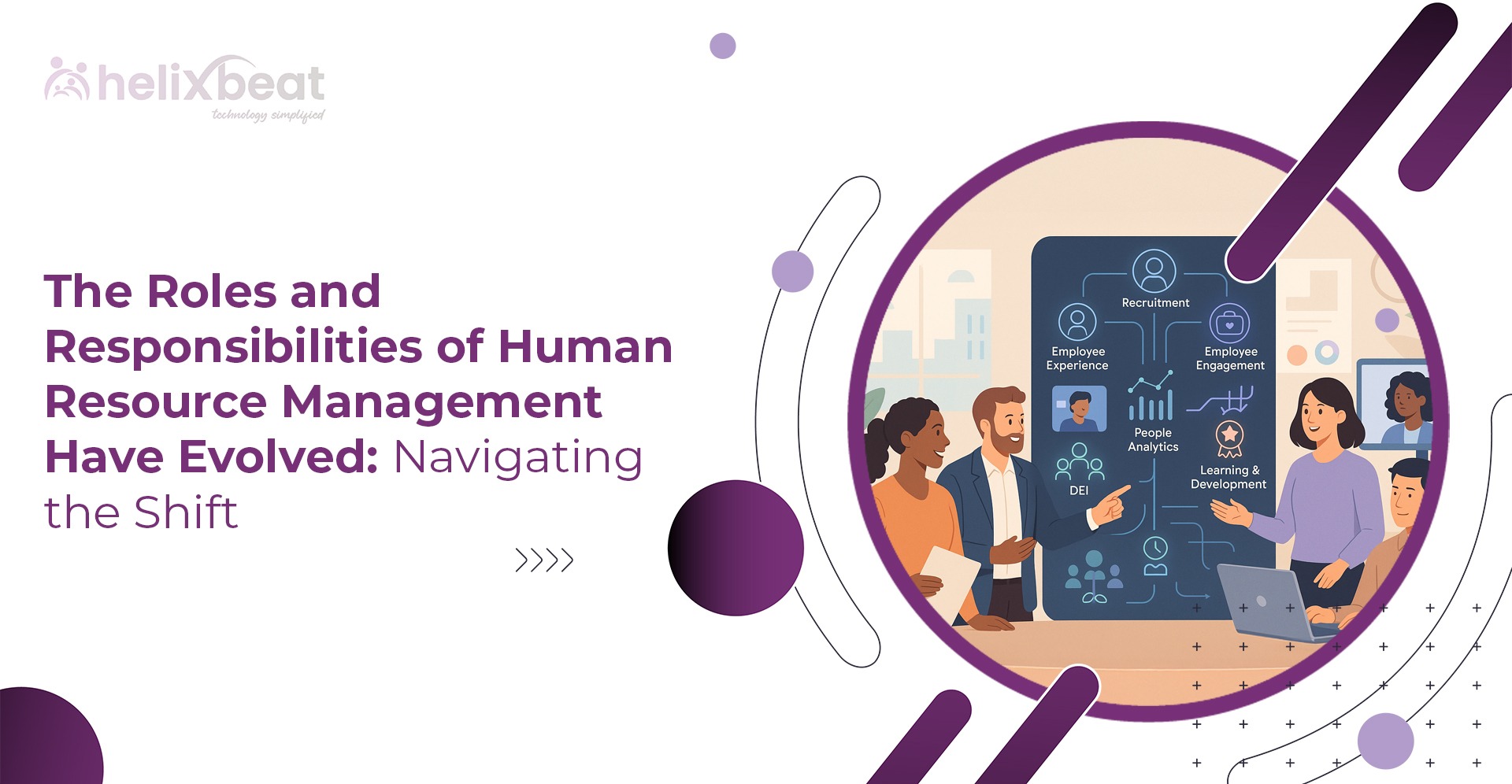Many people think HR is only about hiring employees and handling payroll. But today, HR does much more than that. The role of human resource management has changed completely and has become crucial for businesses.
With advances in technology, the rise of remote work, and changing employee expectations, HR now supports companies in many ways. It helps create a positive workplace, guides leaders to make better decisions, and addresses new challenges like diversity and mental health.
If you still see HR as just paperwork, you could be missing out on how it leads to business growth and success. In this blog, we’ll explore how HR’s role has changed and why businesses must adapt to stay ahead.
Table of Contents
Human Resource Management and Their Responsibilities
Human Resource Management (HRM) is a vital function within any organization that focuses on managing people effectively. The role of human resource management is to attract, develop, and retain talented employees who help the company achieve its objectives. HR professionals handle a wide range of responsibilities that ensure smooth workforce operations and a positive work environment.
Some key responsibilities of HR management include:
- Recruitment and Hiring: Finding the right candidates for job openings through interviews, screening, and selection processes.
- Training and Development: Organizing programs to help employees improve their skills and grow in their careers.
- Employee Relations: Addressing workplace conflicts, promoting teamwork, and maintaining good communication between staff and management.
- Performance Management: Setting clear goals, evaluating employee performance, and providing feedback for improvement.
- Compensation and Benefits: Designing fair salary structures and managing employee benefits like health insurance, leave policies, and retirement plans.
- Compliance: Making sure the company follows labor laws and workplace regulations to avoid legal issues.
- Workplace Safety: Promoting a safe and healthy working environment for all employees.
Overall, HR management plays a crucial role in building a motivated, skilled, and productive workforce that contributes to the organization’s success.

5 Main Reasons Why HR’s Role Is Changing Today
The role of human resource management is growing fast in today’s business environment. Traditional HR tasks are no longer enough to keep up with the demands of modern workplaces.
Here are five main reasons why HR’s role is changing and how innovative tools like Synergy, one of the best HRMS software in India, are helping organizations adapt:
1. Shift from Administrative to Strategic Role
HR is moving beyond routine administrative tasks such as payroll and attendance tracking. With the help of advanced human resource management software, HR professionals now focus more on strategic initiatives like talent development and organizational culture.
2. Technology and Automation
Advances in technology, such as AI and HR software, are automating many traditional HR tasks like payroll and attendance tracking. This shift allows HR teams to focus more on employee engagement and culture rather than just administrative work.
3. Increased Use of Data and Analytics
Data-driven decision-making is transforming HR. With the best human resource management software, HR teams can analyze workforce trends, identify skill gaps, and predict future hiring needs. Synergy’s powerful analytics modules help HR leaders make informed decisions that align with business goals.
4. Compliance with Changing Labor Laws
Labor regulations are continually changing, making compliance more complex. HR must stay updated and make sure company policies reflect legal requirements. A powerful HRMS solution like Synergy automates compliance tracking and generates necessary reports, reducing risks and administrative burdens.
5. Quick Changes in the Work Environment
With the rise of remote work and flexible working hours, HR has to develop new policies and practices to manage productivity, communication, and compliance in these evolving work settings.
In short, the role of human resource management is shifting from traditional administrative duties to a strategic business partner. Utilizing the best HRMS software in India, like Synergy, improves HR teams to meet these new challenges.
Benefits of Evolution in Human Resource Management
The evolving role of human resource management helps organizations adapt to changing workforce needs and business goals.
- Improved Talent Retention: Focusing on employee development and engagement reduces turnover and keeps top talent longer.
- Better Alignment with Business Goals: Strategic HR helps align workforce planning with company objectives, boosting overall performance.
- Enhanced Employee Experience: Prioritizing well-being, work-life balance, and career growth creates a more motivated and satisfied workforce.
- Increased Productivity and Innovation: Empowered employees and transformational HR practices encourage creativity and higher output.
How the Role of HR Is Changing from One Focus to Another
The role of human resource management is shifting its focus in several important ways to meet workforce needs. Here are some key transitions HR is experiencing:
1. From Talent Acquisition to Talent Development
While hiring great talent remains important, HR is increasingly focusing on developing existing employees. This includes training, upskilling, and career path planning to build a stronger, more skilled workforce.
2. From Process Execution to People Empowerment
HR used to concentrate on enforcing policies and processes. Today, the focus is on empowering employees by fostering engagement, promoting a positive culture, and supporting work-life balance.
3. From Operational to Transformational
Instead of just managing day-to-day HR tasks, HR leaders now help transform employees by introducing new ways of working, encouraging innovation, and supporting organizational change.
4. From Isolated Function to Integrated Business Role
HR is moving away from working in isolation to becoming integrated with other departments like finance, marketing, and operations. This collaboration helps create a unified approach to achieving company success.
These shifts show how HR has grown from a back-office function to a key player in shaping the future of organizations.
How Human Resource Management Solves Modern Workplace Challenges With Synergy HRMS
The rise of remote and hybrid work models has created new challenges in tracking attendance and maintaining effective communication.
1. Managing Remote and Hybrid Work
The rise of remote and hybrid work models has created new challenges in tracking attendance and maintaining effective communication. With Synergy, a top human resource management software, HR teams can monitor employee hours, manage shifts, and ensure effective collaboration no matter where team members are located. This flexibility helps keep remote work organized and productive.
2. Enhancing Employee Engagement and Well-Being
Keeping employees motivated and satisfied is also one of the important factors in today’s workplace. Synergy helps HR managers track performance, collect regular feedback, and run wellness initiatives. HR can create a supportive environment that promotes engagement, reduces burnout, and improves overall job satisfaction.
3. Streamlining Payroll and Benefits Management
Payroll processing and benefits administration can be complex and time-consuming. Synergy’s integrated payroll features automate salary calculations, tax deductions, and benefits tracking, reducing errors and saving time. This automation helps HR maintain accuracy and transparency while delivering timely compensation.
Final Thoughts
As the workplace changes, HR must adapt to handle new challenges like remote work, employee well-being, and rapid technology shifts. The evolving role of human resource management requires tools that go beyond basic tasks to support strategic growth and employee engagement.
Synergy HRMS is designed to meet these needs by automating everyday HR processes such as payroll, attendance tracking, and employee data management, all from a single, user-friendly platform.
By adopting Synergy HRMS, businesses can make their HR functions more efficient, flexible, and aligned with overall company goals. If you’re looking to grow your HR department and overcome modern workplace challenges, Synergy HRMS offers the smart, all-in-one solution to help you succeed in the long term.
FAQ:
1. What are the seven roles of human resource management?
The seven main roles of human resource management are hiring the right people, training employees, managing performance, handling employee relations, managing pay and benefits, ensuring legal compliance, and maintaining workplace safety.
2. What is HR management software?
HR management software is a digital tool designed to help HR teams automate and manage tasks like employee records, payroll, recruitment, attendance, and performance tracking efficiently.
3. Which is the best HR software?
The best HR software depends on the company’s needs, but the popular option is Synergy. Synergy HRMS is known for its comprehensive features and ease of use.
4. What tools are used in HR?
HR teams use tools such as applicant tracking systems (ATS), payroll software, performance management platforms, employee engagement apps, and learning management systems (LMS) to streamline their work.
5. What is HR software called?
HR software is commonly called Human Resource Management Systems (HRMS), Human Capital Management (HCM) software, or HR Information Systems (HRIS).
6. What is payroll in HR?
Payroll in HR refers to the process of calculating and distributing employees’ salaries, wages, bonuses, and deductions, as well as managing tax withholdings and compliance with labor laws.














